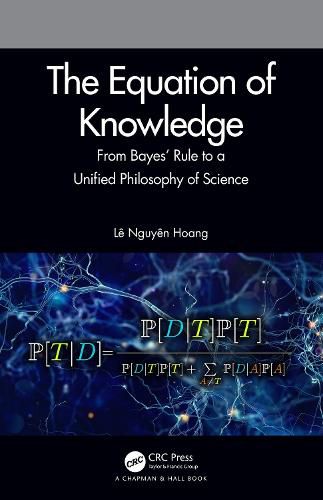Readings Newsletter
Become a Readings Member to make your shopping experience even easier.
Sign in or sign up for free!
You’re not far away from qualifying for FREE standard shipping within Australia
You’ve qualified for FREE standard shipping within Australia
The cart is loading…






The Equation of Knowledge: From Bayes’ Rule to a Unified Philosophy of Science introduces readers to the Bayesian approach to science: teasing out the link between probability and knowledge.
The author strives to make this book accessible to a very broad audience, suitable for professionals, students, and academics, as well as the enthusiastic amateur scientist/mathematician.
This book also shows how Bayesianism sheds new light on nearly all areas of knowledge, from philosophy to mathematics, science and engineering, but also law, politics and everyday decision-making.
Bayesian thinking is an important topic for research, which has seen dramatic progress in the recent years, and has a significant role to play in the understanding and development of AI and Machine Learning, among many other things. This book seeks to act as a tool for proselytising the benefits and limits of Bayesianism to a wider public.
Features
Presents the Bayesian approach as a unifying scientific method for a wide range of topics
Suitable for a broad audience, including professionals, students, and academics
Provides a more accessible, philosophical introduction to the subject that is offered elsewhere
$9.00 standard shipping within Australia
FREE standard shipping within Australia for orders over $100.00
Express & International shipping calculated at checkout
The Equation of Knowledge: From Bayes’ Rule to a Unified Philosophy of Science introduces readers to the Bayesian approach to science: teasing out the link between probability and knowledge.
The author strives to make this book accessible to a very broad audience, suitable for professionals, students, and academics, as well as the enthusiastic amateur scientist/mathematician.
This book also shows how Bayesianism sheds new light on nearly all areas of knowledge, from philosophy to mathematics, science and engineering, but also law, politics and everyday decision-making.
Bayesian thinking is an important topic for research, which has seen dramatic progress in the recent years, and has a significant role to play in the understanding and development of AI and Machine Learning, among many other things. This book seeks to act as a tool for proselytising the benefits and limits of Bayesianism to a wider public.
Features
Presents the Bayesian approach as a unifying scientific method for a wide range of topics
Suitable for a broad audience, including professionals, students, and academics
Provides a more accessible, philosophical introduction to the subject that is offered elsewhere